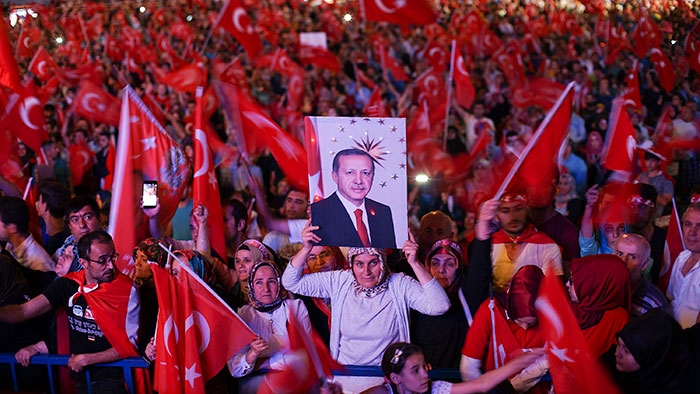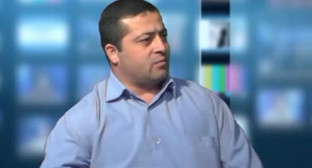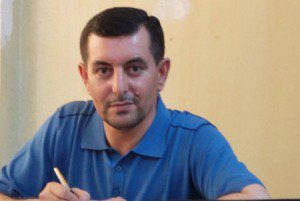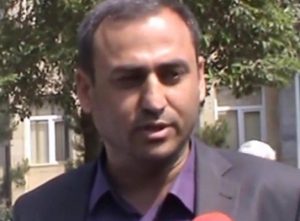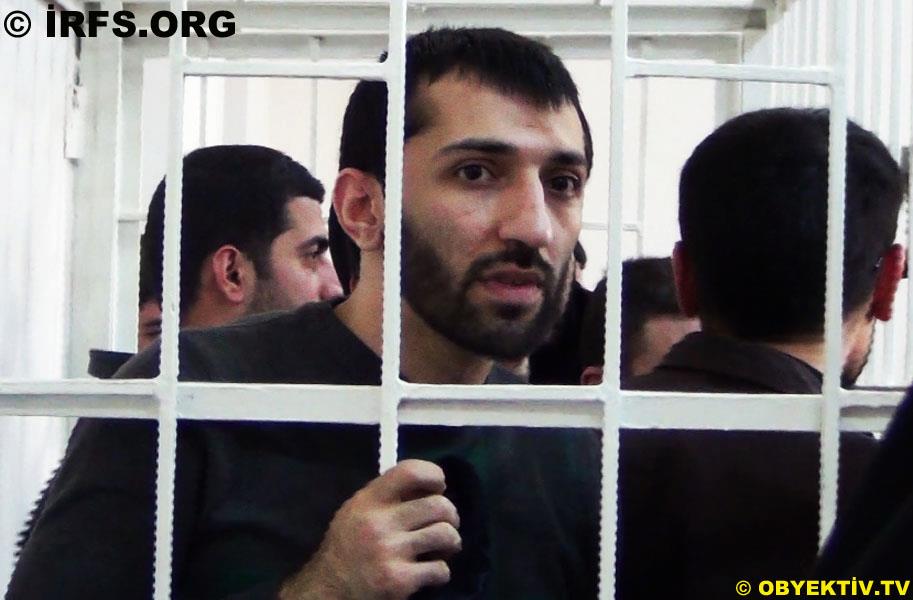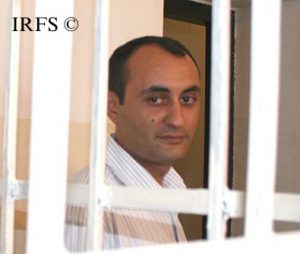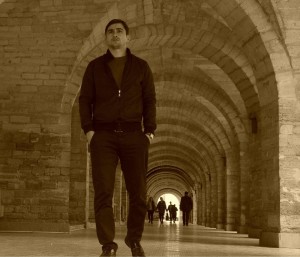8 May 2017 | Media Freedom, News and features, Turkey
[vc_row][vc_column][vc_column_text]
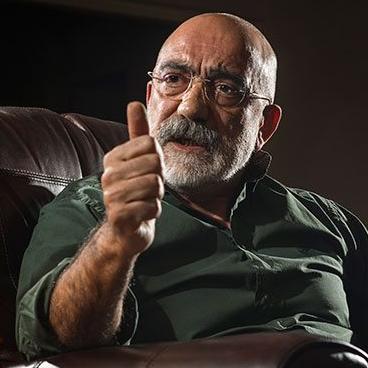
Journalist Ahmet Altan is charged with inserting subliminal messages in support of the failed 15 July coup in Turkey.
Nine months. That’s how long brothers Ahmet and Mehmet Altan have been in pre-trail detention in Turkey. Prosecutors are demanding multiple life sentences for the brothers, who will face their first day in court on 19 June.
“The case against Ahmet and Mehmet Altan is deeply troubling. The ongoing judicial harassment of the Altans and other journalists puts ‘democratic’ Turkey in the same camp as some of the world’s most egregious dictatorships. The post-coup crackdown on freedom of expression and the press must be rolled back,” Melody Patry, head of advocacy, Index on Censorship said.
Ahmet Altan has written for several of the country’s most influential newspapers. He and his brother Mehmet, an academic, were arrested and are being held on suspicion of “spreading subliminal messages”, relating to an appearance Ahmet Altan made on a television talk show the night before the 15 July coup attempt.
Ahmet Altan is one of Turkey’s top journalists, having worked in every position from reporter to editor-in-chief at several newspapers, as well as a producer of television news. He was a columnist for daily newspapers including Hurriyet and Milliyet, and in 2007 he started Taraf, an opposition daily. In 2008 he was charged with “denigrating Turkishness” after he wrote an article dedicated to the victims of the Armenian genocide. He is also considered one of Turkey’s finest novelists, with his most recent book, Endgame, having been published last year.
Mehmet Altan is a professor at Istanbul university, where he has worked for 30 years. A vocal supporter of democracy, he has often called for Turkey to establish its republic on human rights, rather than religious or ethnic identity. He has written several books about politics in Turkey.
The pair were arrested in an early morning raid on 10 September. Ahmet had appeared on a talk show on the Can Erzincan television channel on 14 July, where he is accused of sending messages to viewers to support a coup. The channel has since been shut down. It was perceived by authorities to have been supportive of the cleric Fethullah Gulen, who the government blames for the coup.[/vc_column_text][vc_column_text]
TAKE ACTION
Send a letter of support to Ahmet and Mehmet Altan.
Show your solidarity with the Altans by letting them know the world is watching their case.
Tweet Turkey’s president:
[socialpug_tweet tweet=”.@RT_Erdogan Turkey must end crackdown on #mediafreedom #FreeTurkeyMedia #journalismisnotacrime #AhmetAltan #MehmetAltan” style=”2″ remove_url=”yes” remove_username=”yes”][/vc_column_text][vc_column_text]

Turkey Uncensored is an Index on Censorship project to publish a series of articles from censored Turkish writers, artists and translators.
[/vc_column_text][/vc_column][/vc_row][vc_row][vc_column][vc_basic_grid post_type=”post” max_items=”12″ style=”load-more” items_per_page=”4″ element_width=”6″ grid_id=”vc_gid:1494246747427-afb47fc0-82c9-2″ taxonomies=”55″][/vc_column][/vc_row]
31 Mar 2017 | Mapping Media Freedom, News and features, Turkey, Turkey Uncensored
[vc_row][vc_column][vc_column_text]
“I wear my Turkish and Muslim identity as easily a pair of well-worn jeans. I no longer worry that my writing will land me in trouble.”
These were some of the heady feelings I shared with Yeni Safak, a highbrow pro-Islamic newspaper, in a 2005 interview. Recep Tayyip Erdogan and his conservative Justice and Development Party (AKP) had been in power for just three years. Overtly pious yet savvily flexible AKP used its big popular mandate to dismantle decades of army tutelage and embark on a giddying raft of reforms. Turkey, it seemed, was on a path to full-blooded democracy, shaming the European Union into opening talks for Turkish membership that same year.
It was a golden age. Erdogan became the first leader to publicly acknowledge that the country’s long-suffering Kurds had been treated unfairly by the state. Bans on the Kurdish language were steadily eased while Kurdish rebel leaders sat opposite Turkish government officials to hammer out a deal for lasting peace.
The changes swept across the ethnic, religious and ideological divide. Using the word genocide which accurately captures the horrors that befell the Ottoman Armenians in 1915 was no longer a criminal offence. In 2003, Turkey’s long-suppressed yet vibrant LGBT community held its first ever gay pride march in Istanbul. In 2011, Zenne, a film about the first officially recorded gay honour killing in Turkey, swept five of the country’s prestigious Antalya Golden Orange awards including best film. That night as I snuggled in bed with my beloved friends and the film’s co-directors, Caner Alper and Mehmet Binay, my heart soared. Albeit in fits and starts, my country was becoming a community of shared values, where citizens of all stripes and creeds could find a place for themselves, be respected, and treated equally before the law. And yes, a majority Muslim country that could prove to hundreds of millions of other Muslims living under thuggish regimes that yes, it is possible, that yes, they too can become us, this. Or so I believed.
Six years on it all seems like a distant dream.
Today, Yeni Safak, is nothing but a government propaganda sheet, spouting off obscene conspiracy theories about how everything from the failed July 2016 coup attempt, to the deadly New Year’s Eve shooting spree at the Reina nightclub in Istanbul, were all engineered by the USA, and other dark forces bent on destroying Turkey.
Apparently I was among them. Turgay Guler, the managing editor of another pro-government title, Gunes, said I helped “plan” the Reina attack. He declared this to his 480 thousand plus Twitter followers unleashing a tidal wave of cyber threats which inundated my timeline for days. The tweet has not been removed. A Turkish prosecutor saw no harm in it and ignored my formal complaint, as has Twitter. Yet, well over a hundred of my colleagues, some of them dear, trusted friends, are languishing in jail for airing critical views of the government that are grounded in hard facts.
Peace with the Kurds is also on thin ice. A two and a half year-long ceasefire with the Kurdish rebels broke down in July 2015, soon after Mr Erdogan disowned a draft roadmap for peace that was initiated between his government and Kurdish leaders. The rebels recklessly threw coals on the fire by carrying the battle into towns and cities. Over 2,000 people, at least 300 of them are thought to be civilians, have died in the fighting since then
Emboldened by the new spirit of openness Diyarbakir, the biggest and most vibrant city in the mainly Kurdish south-east region had been striving to recreate its multi-cultural past. Udi Yervant, a renowned Armenian oud virtuoso gave up his life in California to return. Today, Diyarbakir is a ghost of its former self. Large chunks of its historic centre, home to a glorious Armenian Orthodox church, and a cherished Ottoman mosque, were pulverised following months of bitter fighting between Kurdish rebel youths and Turkish security forces, who bloodily prevailed. Diyarbakir’s co-mayors, a man and a woman, in keeping with the main Kurdish parties’ emphasis on gender equality, are currently in prison on thinly-supported terror charges.
Tens of thousands of others have been sacked, jailed or both, on tenuous charges of involvement in the failed putsch. Fethullah Gulen, the Sunni cleric and a former ally of Erdogan is accused of masterminding the coup. While there is little doubt that many of his associates were involved few believe they were acting alone.
Torture and arbitrary detentions are once again the norm. Not since the 1980 coup has Turkey been this divided, broken and grim. Should yes votes outnumber the nos in a critical referendum on formalising the vast powers Erdogan already exercises, Turkey’s sharp turn towards authoritarianism can only accelerate. And in the opposite case a fresh cycle of revenge may be on the cards.
How did it come to this? Many say it is because Erdogan was never serious about democracy. His real goal all along was to supplant the generals’ tutelage with his own. Others blame Turkey’s perennially squabbling pro-secular opposition politicians.
Power crazed Gulen has caused incalculable harm as well. Then there is Europe which held out the hope of full membership only for the likes of Germany’s Angela Merkel and the former French president, Nicholas Sarkozy to declare that it was all a farce. Turkey was too big, too Muslim and too poor. Either way, the rise of populism and xenophobic nationalism infecting Turkey is a global trend.
Many cast the April 16 referendum as a final chance to turn back the clock. But the odds are heavily stacked against the opposition. The referendum is being held under emergency rule. The government has virtually full control of the media. It is painting the vote as a choice between Erdogan and the abyss, between patriotism and treachery. Whatever the outcome, Turkey has entered uncharted waters. The big question now is how long it can remain afloat.[/vc_column_text][vc_column_text]

Turkey Uncensored is an Index on Censorship project to publish a series of articles from censored Turkish writers, artists and translators.
[/vc_column_text][vc_basic_grid post_type=”post” max_items=”4″ element_width=”6″ grid_id=”vc_gid:1490975695361-635cda74-947b-0″ taxonomies=”8607″][/vc_column][/vc_row]
29 Mar 2017 | Azerbaijan, Azerbaijan News, Digital Freedom, Mapping Media Freedom, News and features
[vc_row][vc_column][vc_column_text]
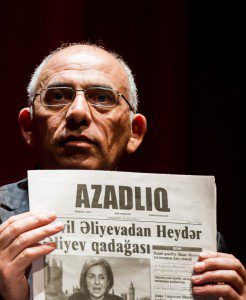
Rahim Haciyev, acting editor-in-chief of 2014 Index on Censorship Freedom of Expression Journalism Award-winning Azerbaijani newspaper Azadliq (Photo: Alex Brenner for Index on Censorship)
Civil, political and human rights are harshly restricted and frequently violated in Azerbaijan. Independent and critical journalists frequently find themselves — or their families — targeted.
Rahim Haciyev, acting editor in chief of the Index Award-winning independent newspaper Azadliq, was forced to flee Azerbaijan after years of official harassment. The government has repeatedly cracked-down on dissent.
Haciyev wrote to Index on Censorship from exile in a western European country:
I’m very sorry that the repressive policy of the Azerbaijani authorities against the Azadliq newspaper forced me to leave the country.
After the arrest of the newspaper’s financial director Faig Amirli, the authorities soon stopped issuing a print version. Amirli was arrested on obviously fabricated charges. I was summoned several times to the prosecutor’s office several times to testify about the paper’s financial affairs. The prosecutors said that this was connected with the criminal case of Amirli, but are invesitgating him under charges of “inciting religious hatred” and “violating the rights of citizens under the pretext of conducting religious rights”.
It turned out that they were interested in the financial issues of the newspaper in order to find a way to silence it. In addition, several employees of the newspaper were summoned for questioning. Then a court ordered tax authorities to comb through the paper’s financial activities. It’s clear that this was undertaken to increase pressure on the newspaper and me personally.
Aiming to cripple Azadliq, the government-owned distribution company was ordered to withhold circulation receipts — $84,000. So we weren’t able to print or even pay our bills. Three staffers are in prison — Seymur Hezi, Faig Amirli and Elchin. Each of them had sharply criticised the lawlessness and corruption of Azerbaijani officials.
In February, 11 Azadliq employees were summoned to the prosecutor’s offices to be interrogated again. Several government agencies increased their pressure on the newspaper’s online operation.
I had been warned twice in the past two years by the prosecutor general’s office that under my leadership Azadliq had been slandering Azerbaijani authorities. In their notices I was told that failure to comply with their terms would mean legal repercussions for me. But I refused. The newspaper continued to report on corruption, abuses of power and the absence of the rule of law. We were devoted to pursuing the truth.
And that is why the authorities intensified repression against the newspaper. Now this lawlessness has forced me to leave the country.
This decision was extremely difficult. I am cut off from my family and friends. I have two children and don’t know when I will see them again.
But despite all the problems I will continue to work daily for the newspaper’s website.
It’s my job, this is my job, this is my life.
Rahim Haciyev
Acting Editor-in-Chief, Azadliq
Haciyev is just one of the many journalists who have been targeted by Azerbaijani authorities in recent years. The country is ranked 163rd out of 180 countries in RSF’s 2016 World Press Freedom Index, which ranks 180 countries according to the level of freedom available to journalists. Almost everyone who speaks out against the regime of President Ilham Aliyev, including journalists, human rights defenders, activists and bloggers, are commonly imprisoned on spurious charges, such as drug and weapon possession, hooliganism and tax evasion. Reports of torture and abuse are typical by those being detained. At least 15 Azerbaijani prisoners of conscience currently remain in jail, including:[/vc_column_text][/vc_column][/vc_row][vc_row][vc_column width=”1/2″][vc_column_text]
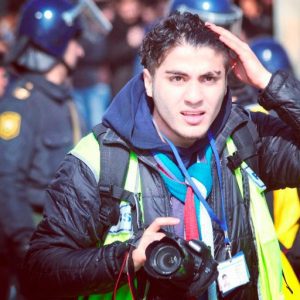
Mehman Huseynov (Twitter)
Mehman Huseynov, an Azerbaijani journalist and pro-opposition blogger, was sentenced to two years in jail on 3 March by a Baku court for defaming the police chief of the city’s Nasimi district. Huseynov intends to appeal his sentencing. According to Front Line Defenders, a group of police officers violently attacked Huseynov on 9 January. The next he was brought to court, found guilty of disobeying police orders and fined 200 manat (£96). [/vc_column_text][/vc_column][vc_column width=”1/2″][vc_column_text]
Founder and editor of online news portal Kend.info Elchin Ismayilli was arrested on 17 February on charges of “extorting money” and “aggravated abuse of a position of influence”. According to the Caucasian Knot, he was also accused of blackmailing a local office, charges he insists were fabricated to silence his coverage of local corruption and human rights violations. On 18 February, Ismayilli was sentenced to a pre-trial detention period of 24 days. He has previously been subject to multiple arrests and cases of harassment related to his work as a journalist.[/vc_column_text][/vc_column][/vc_row][vc_row][vc_column width=”1/2″][vc_column_text]
On 3 March, a court decided to prolong the period of investigation of Faig Amirli for three months, the Azerbaijan Press Agency reported. Amirli, financial director of newspaper and assistant chairman of the Azerbaijani Popular Front Party (APFP), was arrested on 20 August 2016 for “inciting religious hatred” and “violating the rights of citizens under the pretext of conducting religious rights,” according to Radio Free Europe/Radio Liberty.[/vc_column_text][/vc_column][vc_column width=”1/2″][vc_column_text]
Writer and blogger Rashad Ramazanov was arrested on 9 May 2013 and sentenced to nine years in prison. According to English PEN, his charges included “illegal possession and sale of drugs”. Police claimed to have found nine grams of heroin on his body, although Ramazanov insists that the drugs were planted by the officers, who he claims also beat him up and tortured him during interrogation. Ramazanov was sentenced to nine years in prison in November 2013 on a trumped-up drug trafficking charge. PEN International reported that on 23 January Ramazanov was moved to solitary confinement for 15 days, the reason for which remains unknown. On 7 February Ramazanov was released from solitary confinement, and his family was given permission to visit him.[/vc_column_text][/vc_column][/vc_row][vc_row][vc_column width=”1/2″][vc_column_text]
Founder and editor of the website Azel, Afgan Sadygov, was sentenced on 12 January to 2.5 years in jail. Sadygov was arrested on 22 November 2016 based on accusations of “hooliganism” after he was attacked on 9 August 2016 and allegedly hit a woman, Contact Online news reported. Sadygov’s website often reports on issues such as poor infrastructure maintenance, bad quality of roads and waste of public funds in Azerbaijan’s Jalilabad region.[/vc_column_text][/vc_column][vc_column width=”1/2″][vc_column_text]
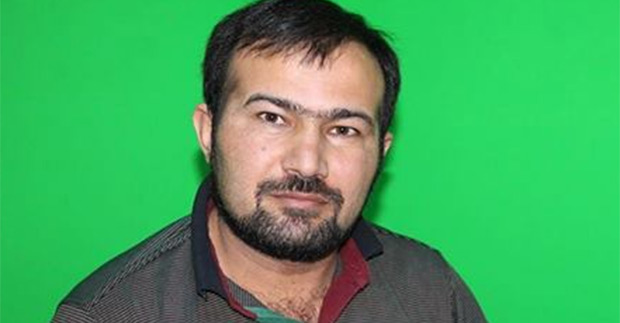
Seymur Hezi
According to MeydanTV, the Supreme Court will hear the appeal of Seymur Hezi, reporter for opposition news source Azadliq and presenter for critical TV program “Azerbaycan Saati” on 13 April. The journalist was sentenced to five years in prison on 29 January 2015 on a trumped-up charge of aggravated hooliganism, Index on Censorship reported. The charge came after Hezi was attacked on 29 August by Maherram Hasanov, a complete stranger, and defended himself. Hezi has accused President Ilham Aliyev and chief of staff Ramiz Mehdyev of ordering his arrest.[/vc_column_text][/vc_column][/vc_row][vc_row][vc_column width=”1/2″][vc_column_text]
The lawyer of Nijat Aliyev, former chief editor of religious website Azadxeber.org, has not been able to get hold of the text of the verdict of the Supreme Court of Azerbaijan for his client, Contact Online news reported. Aliyev’s lawyer believes that the delay has been intentional in order to prevent the filing of a complaint with the European Court of Human Rights, Contact Online news reported. According to IRFS, Aliyev was detained on 20 May 2012 and sentenced to 10 years in prison on 9 December 2013 on charges of illegal possession of drugs and weapons, incitement of religious hatred, calls to seize power and distributing banned religious literature. Aliyev’s website previously published criticisms of the government’s policies in regards to religion, the possibility of a LGBT parade in Baku and the allotment of too much funding for the Eurovision Song Contest in 2012, OCCRP reported.[/vc_column_text][/vc_column][vc_column width=”1/2″][vc_column_text]
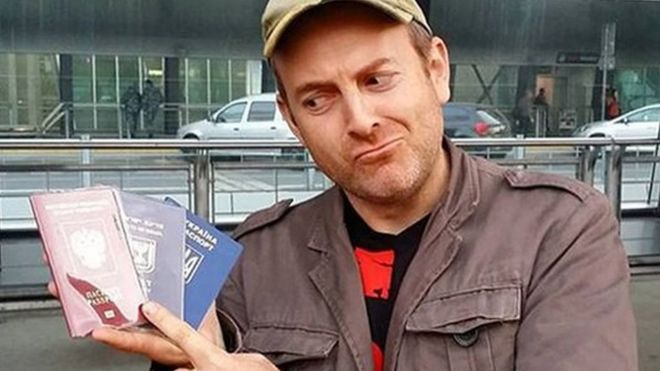
Alexander Lapshin (BBC)
Russian-Israeli travel blogger Alexander Lapshin was extradited from Belarus to Azerbaijan on 7 February. He faces up to five years in prison on charges of “public calls against the state” and “unauthorised crossing of borders,” according to Armenian News Agency ArmenPress. These charges came after Lapshin traveled to the disputed territory of Nagorno-Karabakh and sympathised in his blog entries with the Armenians he met, GlobalResearch reported. [/vc_column_text][/vc_column][/vc_row][vc_row][vc_column width=”1/2″][vc_column_text]
Fikrat Faramazoglu, editor-in-chief of news website jam.az, has been detained since 30 June 2016 on the charge of extortion by means of threats, which is punishable by up to five years in prison. According to Azerbaijan Free Expression Platform, these charges originated when a local restaurant owner accused Faramazoglu of extorting money from him when asked to remove defamatory articles about the restaurant on websites owned by the journalist.[/vc_column_text][/vc_column][vc_column width=”1/2″][vc_column_text]
Blogger and social media activist Abdul Abilov has been imprisoned since 22 November 2013. According to Azerbaijan Free Expression Platform, Abilov was charged with illegal possession, storage and manufacturing or sale of drugs when authorities claim to have found illegal drugs in his home and on his person, which Abilov continues to protest were planted on him. On 27 May 2014 Abilov was sentenced to five-and-a-half years in prison. Stop Sycophants!, the Facebook page previously run by Abilov, was shut down following his arrest, IRFS reported. The page was known to strongly criticise authorities.[/vc_column_text][/vc_column][/vc_row]
28 Mar 2017 | Belarus, Campaigns -- Featured, Statements
[vc_row][vc_column][vc_column_text]We, the undersigned members of the Civic Solidarity Platform (CSP), a coalition of human rights NGOs from Europe, the former Soviet Union region and North America, and other non-governmental organisations decry the mass detentions of peaceful demonstrators, journalists and human rights defenders, as well as the use of violence and abusive treatment targeting them in Belarus on 25-26 March 2017. These events were the culmination of a series of repressive measures taken by the authorities of the country since the beginning of March to stifle the public expression of grievances. Given the severity of this human rights crisis of unprecedented scale since December 2010, it is crucial that the international community takes resolute action to push for an end to the crackdown in Belarus and justice for those targeted by it.
We condemn the gross violations of the right to peaceful assembly, freedom of expression, freedom from arbitrary detention, and the right to fair trial in Belarus in connection with the recent peaceful protests, and call on the international community to use all available means to put pressure on the Belarusian authorities to immediately end these violations.
Such measures by the authorities should include:
- immediately releasing those currently behind bars because of their involvement in the peaceful protests or their efforts to monitor them;
- dropping charges against all those prosecuted on these grounds;
- carrying out prompt, thorough and impartial investigations into all allegations of arbitrary detention, ill-treatment and other violations of the rights of protesters, passers-by, journalists, human rights defenders and political activists in connection with the protests; and
- bringing those responsible for violations to justice.
We call in particular for the following concrete actions by international community in response to the current crackdown in Belarus:
To the OSCE:
- The OSCE participating States should initiate and support the renewal of the Moscow Mechanism in relation to Belarus and the appointment of a new rapporteur for this process, in view of the fact that the current developments mirror those on the grounds of which this mechanism was invoked in 2011;
- The OSCE Chairmanship should appoint a Special Representative on Belarus, whose mandate should include investigating the recent violations;
- The Office of Democratic Institutions and Human Rights should monitor the trials of those facing charges because of their participation in the recent peaceful protests, or their efforts to monitor and report on them;
- The OSCE Parliamentary Assembly should reconsider holding its annual session in Minsk in July 2017 and identify another host country and city for this event.
To the Council of Europe:
- The Parliamentary Assembly of the Council of Europe should replace its current rapporteur on the situation in Belarus, ensuring that the individual holding this position forcefully speaks out against human rights violations in the country.
To the UN:
- Members of the Human Rights Council should extend the mandate of the Special Rapporteur on the human rights situation in Belarus, continue urging the Belarusian authorities to allow the Special Rapporteur to visit the country, and adopt a strong resolution on the human rights situation in Belarus at the next session of the Council;
- High Commissioner on Human Rights should publicly condemn the crackdown in Belarus and engage in direct contact with the Belarusian authorities on this matter.
To international financial institutions:
- International financial institutions should apply strong human rights conditionality in the implementation of their programs in Belarus and refrain from allocating funding to government projects until the human rights situation in the country has substantially improved. Specifically, the European Bank for Reconstruction and Development should reinstate its calibrated strategy on Belarus.
To the EU:
- The EU member states and institutions should apply stronger and more consistent human rights conditionality to the development of its relations with Belarus and consider the prospects of reinstating sanctions similar to those applied in 2011-12 for widespread human rights violations.
To the USA:
- The US government should consider reinstating the sanctions against Belarus that it suspended in 2015-16.
Background information, based on reports from the ground:
In the afternoon of 25 March 2017, people took to the streets in the Belarusian capital of Minsk for planned peaceful protests on the occasion of the Day of Freedom, which commemorates the Belarusian declaration of independence in 1918. There was as a heavy police and security presence in the city, the downtown area where protests were due to be held was cordoned off, and traffic was blocked on the main Independence Avenue. Local and international human rights monitors representing the CSP member organisations documented the use of heavy-handed tactics by the law enforcement and security authorities to prevent the peaceful protests, for which authorities had not given advance permission as required by Belarusian law and in violation of international standards. At least 700 people were detained on 25 March, including elderly and passers-by. As can be seen on available photos and footage, police forcefully rounded up and beat protesters with batons, although these made no resistance. More than 30 journalists and photographers from both Belarusian and international media outlets were detained; cameras and other equipment of some of them were damaged by police. Toward the evening, police started releasing detainees from the detention facilities, in many cases without charge. However, others remain in detention, and dozens of individuals are expected to stand trial starting Monday 27 March on charges relating to their participation in the peaceful protests.
The following episode requires particular attention: At 12.45 pm local time on 25 March, about an hour before the start of the planned peaceful protest, anti-riot police raided the offices of the Human Rights Center Viasna and detained a total of 57 Belarusian and foreign human rights defenders and volunteers as well as journalists. Human rights defenders and volunteers had gathered there for a training on monitoring the protests and were planning to go to the streets of Minsk for observation of the assemblies. Among them were representatives of Viasna, the Belarusian Helsinki Committee, the Belarusian Documentation Center, Frontline Defenders, International Partnership for Human Rights and other organisations. The police shouted at all present, intimidated them, and ordered to lie down on the floor face down. 57 people were detained without any charges, packed in the buses and brought to the Pervomaisky district police station, where their belongings were searched and their personal information recorded. The detainees were held there for two and a half hours and were released afterwards without charges. One of the detained needed medical treatment because of injuries sustained when being beaten by police. The raid of the offices of Viasna and the detention of the monitors were clearly aimed at intimidating and preventing them from observing the peaceful assembly and documenting possible violations.
The crackdown continued on 26 March, with dozens of people being detained by police as they gathered at October Square in Minsk at noon to express solidarity with those detained the day before. Among the detained on 26 March were at least one human rights defender, one civil society activist and one journalist. Representatives of national and international human rights NGOs, including members of the CSP, continue to document violations perpetrated in connection with the events of the last few days.
The detentions on 25-26 March followed the earlier detention of about 300 people, including opposition members, journalists and human rights defenders in the last few weeks. These detentions have taken place against the background of a wave of peaceful demonstrations that were carried out across Belarus since mid-February 2017 to protest against so-called “social parasites” law which imposes a special tax on those who have worked for less than six months during the year without registering as unemployed. The legislation, which has affected hundreds of thousands of people in the economically struggling country, has caused widespread dismay. On 9 March, President Lukashenko suspended the implementation of the law but refused to withdraw it, resulting in further protests. Many of those detained have been fined or arrested for up to 15 days on administrative charges related to their participation in the peaceful protests. Over two dozen people are facing criminal charges on trumped-up charges of preparation to mass riots.
Signed by the following CSP members:
- Analytical Center for Inter-Ethnic Cooperation and Consultations (Georgia)
- Article 19 (United Kingdom)
- Association UMDPL (Ukraine)
- Bir Duino (Kyrgyzstan)
- Bulgarian Helsinki Committee
- Center for Civil Liberties (Ukraine)
- Centre for the Development of Democracy and Human Rights (Russia)
- Committee against Torture (Russia)
- Crude Accountability (USA)
- Freedom Files (Russia/Poland)
- German-Russian Exchange – DRA (Germany)
- Helsinki Association of Armenia
- Helsinki Citizens’ Assembly – Vanadzor (Armenia)
- Helsinki Committee of Armenia
- Helsinki Committee for Human Rights in Serbia
- Helsinki Foundation for Human Rights (Poland)
- Human Rights Center of Azerbaijan
- Human Rights First (USA)
- Human Rights House Foundation (Norway)
- Human Rights Information Center (Ukraine)
- Human Rights Monitoring Institute (Lithuania)
- The institute for Reporters’ Freedom and Safety (Azerbaijan/Georgia/Switzerland)
- Index on Censorship (United Kingdom)
- Institute Respublica (Ukraine)
- International Partnership for Human Rights (Belgium)
- Kazakhstan International Bureau for Human Rights and Rule of Law
- The Kosova Rehabilitation Center for Torture Victims
- Macedonian Helsinki Committee
- Moscow Helsinki Group (Russia)
- The Netherlands Helsinki Committee
- Norwegian Helsinki Committee
- Office of Civil Freedoms (Tajikistan)
- Promo-LEX (Moldova)
- Protection of Rights without Borders (Armenia)
- Public Association “Dignity” (Kazakhstan)
- Public Alternative Foundation (Ukraine)
- Public Foundation Golos Svobody (Kyrgyzstan)
- Public Verdict Foundation (Russia)
- Regional Center for Strategic Studies (Azerbaijan/ Georgia)
- Serbian Helsinki Committee for Human Rights
- SOLIDARUS e.V. (Germany)
- The Swiss Helsinki Committee
- Ukrainian Helsinki Human Rights Union
- Women’s International League for Peace and Freedom
- World Organisation against Torture (OMCT)
Other organisations who have joined the statement:
- Belarus Free Theatre
- Libereco – Partnership for Human Rights (Switzerland)
- PEN International
[/vc_column_text][/vc_column][/vc_row][vc_row][vc_column][vc_basic_grid post_type=”post” max_items=”4″ element_width=”6″ grid_id=”vc_gid:1490686433484-ad7cf42c-cf25-10″ taxonomies=”172″][/vc_column][/vc_row]



